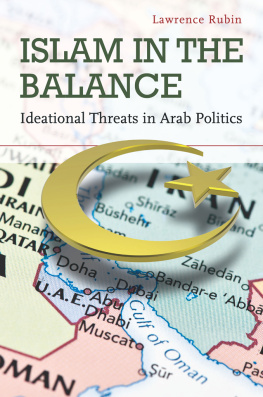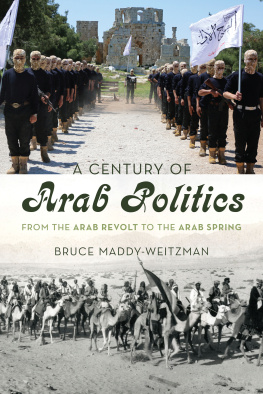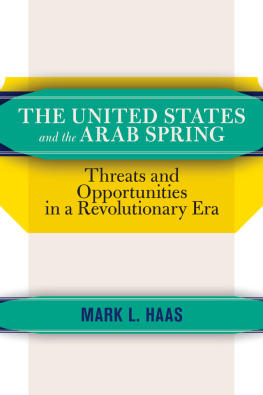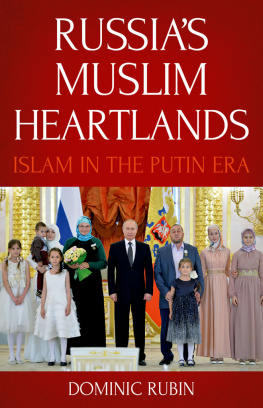Stanford University Press
Stanford, California
2014 by the Board of Trustees of the Leland Stanford Junior University.
All rights reserved.
No part of this book may be reproduced or transmitted in any form or by any means, electronic or mechanical, including photocopying and recording, or in any information storage or retrieval system without the prior written permission of Stanford University Press.
Printed in the United States of America on acid-free, archival-quality paper
Library of Congress Cataloging-in-Publication Data
Rubin, Lawrence, 1973 author.
Islam in the balance : ideational threats in Arab politics / Lawrence Rubin.
pages cm(Stanford security studies)
Includes bibliographical references and index.
ISBN 978-0-8047-9079-6 (cloth : alk. paper)
1. Islam and politicsMiddle East. 2. National securityMiddle East. 3. EgyptPolitics and government1981 4. Saudi ArabiaPolitics and government1982 5. IranForeign public opinion, Arab. 6. SudanForeign public opinion, Arab. 7. Middle EastForeign relations1979 8. Middle EastPolitics and government1979 9. Threat (Psychology)Political aspectsMiddle East. 10. International relationsPsychological aspects. I. Title.
BP173.7.R82 2014
320.55'70956dc23
2013044156
ISBN: 978-0-804-79210-3 (e-book)
Acknowledgments
ISLAM IN THE BALANCE GREW OUT OF AN EFFORT TO reconcile international relations theories with the realities of Middle East politics. The inspiration and material in the pages that follow came from a collection of interactions and experiences over the years. Throughout the course of the 2000s when I lived for periods of time in Morocco, Yemen, and Egypt, I was confronted with a reality far different from the classical international relations theories I had learned. These diverse experiences provided unique insights into how different actors perceive the same threat and in what ways. Moreover, leaders seemed to respond to and be alarmed by words and ideasforces that were difficult to measure by traditional means. Thus, my initial research agenda to understand the impact of Irans nuclear proliferation efforts on Arab threat perceptions soon evolved into something much larger.
This book is an analysis of how ideas, or political ideology, can threaten states and how states react to ideational threats. More specifically, it examines the threat perception and policies of two influential Arab Muslim-majority states, Egypt and Saudi Arabia, in response to the rise and activities of two Islamic states, established in Iran (1979) and Sudan (1989). My aim in this book is to provide important insight about the role of religious ideology in international and domestic politics of the Middle East and, in doing so, advance our understanding of how, why, and when ideology affects threat perception and state policy.
The major theme running through the book is that transnational ideologies may present a greater and more immediate national security threat than shifts in the military balance of power. There are two main components of this theme. First, ideology, or ideational power, triggers threat perception and affects state policy because it can undermine domestic political stability and regime survival in other states. Second, states engage in ideational balancing in response to an ideological threat. The analytical framework for understanding strategic interaction in this realm of international politics is referred to as an ideational security dilemma.
In this work, I aim to combine a study of international relations with an in-depth regional focus on the Middle East. While the book examines the threat perception and policies of two Arab Muslim-majority states, Egypt and Saudi Arabia, it has broader implications for the region and lessons for the future of the Middle East. My objective is to provide a clearer understanding of these issues and relate why they are relevant for academics and policymakers alike. Because the region is changing so rapidly, I conclude with the fall of the Morsi regime in Egypt, two-and-a-half years after the beginning of the Arab uprisings. I am confident that my main arguments will continue to be relevant in the future.
This book has evolved over a long period of time and I have many debts to acknowledge. Leonard Binder and Deborah Larson were instrumental in my professional and academic development, as were Barry ONeill, Bertram Raven, and David Rapoport. David in particular has served as an informal mentor. I also benefited from my interactions with Marc Trachtenberg and Steven Spiegel while I was at UCLA.
While my language training and experience in other parts of the Arab world had a profound effect on my intellectual development, the majority of my field research took place in Cairo over a period of many years. I wish to thank the many individuals who gave of their time to talk to me. Only a portion of the interviews I conducted over the years are cited in the book. In some cases, the interviews gave me important background information not found in the media. When the interviews are cited, I did not refer to the interviewee by name if the interviewee requested that his/her name not be used. Nonetheless, I would like to mention a few individuals who were generous with their time or pointed me to others that could help me: Albadr Alshateri, Gehad Auda, Mohammed Abdel Salaam, Mohammed Abu Dhahab, David Dumke, Mohammed Habib, Theodore Karasik, and Moheb Zaki. I would also like to thank Andreas Jacobs, the former head of the Konrad Adenauer Stiftung in Cairo, for providing me with a place to work and Dan Ross for his hospitality.
I received support both institutionally and financially from many sources. These include: multiple Foreign Language Area Studies Fellowships for Arabic, which were administered by the UCLA Von Grunebaum Center for Near East Studies; the Institute of Global Cooperation and Conflict; and the Horowitz Foundation for Social Policy.
Outside of UCLA, I would like to thank Shai Feldman and Kristina Cherniahivsky for my year as a visiting lecturer on the Myra and Robert Kraft Chair in Arab Politics at the Crown Center for Middle East Studies, Brandeis University (20082009). I would also like to thank the Belfer Center for Science and International Affairs at the Harvard Kennedy School of Government where I was a research fellow (20092010) with the Dubai Initiative. The interactions I had during these two years in Boston were instrumental in shaping this project. Lastly, the Ivan Allen College for Liberal Arts at the Georgia Institute of Technology provided me with teaching relief to complete the book.
My debts also extend to my colleagues and friends from a variety of capacities over the years: Lisa Blaydes, Eric Bordenkircher, Dan Byman, Udi Eiran, Sarah Feuer, Jarrod Hayes, Ron Hassner, Justin Hastings, Patrick James, David Karol, Joshua Karsh, Megan Kroll, David Palkki, Norrin Ripsman, Dane Swango, Fred Wehrey, Melissa Willard-Foster, Stacey Philbrick Yadav, and Vikash Yadav. I am particularly grateful to Ilai Saltzman and Jenna Jordan for reading multiple chapters and multiple drafts of chapters. I thank the anonymous reviewers who provided critical feedback. Editor Geoffrey Burn, Assistant Editor James Holt, and Senior Production Editor Tim Roberts were instrumental in shepherding this book through the process.
Lastly, I owe my family a great deal of thanks. My love goes to my parents, siblings, and my two children, Elie and Matan, who always help me with their smiles and endless laughter. And finally, my greatest appreciation goes to my wife, Adi, who has been with me from the beginning and has been my biggest source of support.








